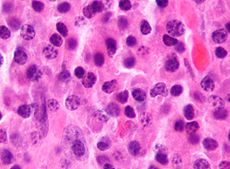 |
| The micrograph shows abundant cancerous plasma cells. – by Nephron via Wikimedia |
CANCER DIGEST – July 20, 2015 – Results from a clinical trial testing a new therapy for multiple myeloma demonstrated a clinical response in 80 percent of patients with advanced disease who had undergone a stem cell transplants. A clinical response indicates a therapeutic effect for the treatment that uses a person's own immune system to recognize and destroy cancer cells.
Multiple myeloma is cancer of plasma cells that multiply out of control and crowd out normal blood cell production in the bone marrow. The results of the study were published this week in the journal Nature Medicine by researchers at Penn's Abramson Cancer Center co-led by Carl H. June, MD, and Edward Stadtmauer, MD.
In the early stage clinical trial of 20 patients, the engineered cells were found safe, migrated to the bone marrow tumor, and persisted for two years after infusion in 90 percent of the patients.
Nearly 70 percent had a near complete or complete response within three months post treatment, meaning the cancer stopped growing or was reduced, which compares to the expected response of less than 40 percent in patients without high-risk disease following an stem cell transplant.
At the point in the trial when half of the patients had been followed a little over 21 months, 15 of the 20 patients were surviving and 10 remained progression free, meaning the cancer had stopped growing. As of April 2015, with half of the patients had reached 30 months of follow-up, the median overall survival had increased to 32.1 months.
“This is an important step in immunotherapy research for multiple myeloma, a tough-to-beat cancer that is largely incurable," said Stadtmauer, “with a five-year survival rate of approximately 50 percent – highlighting the need for new approaches to improve therapeutic options after an ASCT (stem cell transplant.”


No comments:
Post a Comment